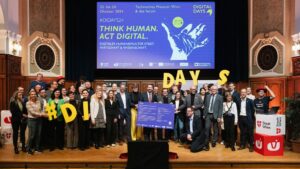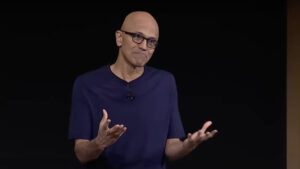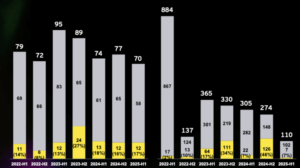0bsnetwork: „The Time For a Zero Bullshit Blockchain is Definitely Here“

“CEE Star of the Week“ is our weekly series of short stories where we present a company from Central and Eastern Europe that has recently achieved something significant – closed an investment round, won a prize, successfully launched on a new market, made a prominent hire, etc. The stories can be found both on trendingtopics.at and trendingtopics.eu.
Take one of the new, hot DeFi tokens of your choice or crypto assets like those from Crypto.com, Tether or Chainlink – and you will find that most young blockchain projects are based on Ethereum. So it is all the more surprising that a Croatian entrepreneur builds his own blockchain from Vienna. It listens to the cryptic name 0bsnetwork and follows its own strategy.
Founder and mastermind Srdjan Kupresanin explains in the interview, how the Blockchain functions, waurm Startups like Eloop on it set and where the differences to Ethereum are.
Trending Topics: Let’s start with a simple question. Why is it called 0bsnetwork? What does „bs“ stand for?
Srdjan Kupresanin: James Hitchcock, our Head of Development, and I have shared the vision of building truly useful and valuable applications of blockchain technology in business and public services for years, from even before we actually met. That’s where our „Blockchain From The Real World“ tagline stems from. We started working on the implementation of that vision at the tail end of the blockchain hype cycle in early-mid 2018, when hundreds of projects around the world raised vast sums of money on claims and promises of questionable value.
We started joking internally that we are building a zero bullshit platform. We tried to come up with a cool brand name for what we were building, but since neither of us is very “marketingy“, we couldn’t come up with anything we liked, so we just kept building our products with the working title 0bsnetwork (= zero bullshit network), thinking that no serious company would ever want to associate itself with such a brand and that we will come up with a proper name at some point.
Two and a half years later, 0bsnetwork is still the name of the blockchain platform we launched and I’m happy and proud to report that we do have some very serious companies working with us. Not only that, but I’ve taken 0bsnetwork with me on several occasions to the Palace of Westminster where I had the honour of contributing to the policy discussions of the UK Parliament on blockchain applications in the real world. After all the hype and unfortunately many instances of abusing blockchain technology for getting rich quick schemes, the time for zero bullshit blockchain for the real world is definitely here.
There are a lot of blockchain companies, projects and foundations out there. What makes your blockchain solution special?
Our firm focusses on the applicability of blockchain in the real world. It’s a simple and powerful statement that guides our every decision, both on the blockchain platform we launched (the 0bsnetwork itself), as well as the applications for various use cases that we are building on top of it.
- We launched stable transaction fees on the platform, as opposed to highly volatile fees on other platforms
- Custom fees: a creator/issuer of a token on 0bsnetwork can enable payment of platform fees in their own token, so that its users don’t have to go to an exchange to purchase the native “currency” of the platform just to be able to send some tokens to a friend, or to pay for a cup of coffee. Also, the token issuer can decide on the actual cost of a transaction paid for by their token. As an example, Raiffeisen Bank International can decide to charge 10 cents per transaction; 5 cents is the default network fee and that will go to the node operators and Raiffeisen bank can keep the remaining 5 cents. Alternatively they can decide that a transaction paid for by the Raiffeisen token will cost 2 cents, in which case the bank would sponsor each transaction by their users with the remaining 3 cents needed to cover the platform fee of 5 cents.
- Data Transactions: a crucial feature for business applications, enabling easy and powerful set of business process functionalities. Data Transactions are formatted as a set of “key – value” pairs. As an example, the key can be “temperature”, or “GPS coordinates”, “seller ID”, “product ID”, “contract signed”, etc. The values assigned to those keys could then be “22 degrees”, the actual location at any given time, actual identifier of a company or product, “yes” or “no”, etc. These values can be updated manually, automatically based on a set of predefined criteria, or by IoT sensors attached to machinery, vehicles, farmland etc.
- Business logic that remains outside of the blockchain for the most part, as opposed to insistence on the concept of “smart contracts”, which set the business logic in stone and introduce unacceptable levels of complexity and difficulty of ensuring error/bug-free code. Our firm belief is that business logic needs to remain adaptable to the changing market environment and the blockchain layer should be used for what it is: an immutable ledger of states and transactions.
- Focus on keeping our APIs stable so that when a developer, startup or a well established business develops a solution/app/product based on 0bsnetwork or the services we’ve built on top of it, it doesn’t fall apart with a next software or feature update
What brought yout to the wild crypto space? When did you catch fire?
I personally started learning about blockchain in 2010, soon after the Bitcoin blockchain was first created and launched. I was and remain fascinated by the technology that enables decentralised trustless relationships between stakeholders, but I never got interested in the speculation around crypto currencies. Sadly (!), as I am a bitcoin millionaire who lost access to his wallets many years ago (I was mining bitcoin for a while in the very beginning as one way to get a better understanding of the technology). James also started ages ago, similarly out of fascination with the technology itself, but from a much deeper technical level. He is obsessed with cryptography, decentralised computing, open vs private, APIs, integration with IoT, existing enterprise, banking, cloud and other systems.
You want to offer a blockchain platform for real world business. Can you give some examples to show how it works?
Sure. Some of the defining characteristics of a platform for business are compliance with established regulation, taking part in policy discussions for the adaptation of the regulatory framework for ongoing technological development, stability of its Application Programming Interface, so that features developed as part of various applications continue working reliably for years, integration of industry standard modules for qualified electronic signatures, cooperation with reputable providers of services such as identity verification, banking products, interfaces and services. These and many more are the foundation of our approach.
One example is the Eloop vehicle fleet crowd investing project, for which we integrated identity verification provided by the Austrian State Printing House, Staatsdruckerei, money transfer infrastructure of Klarna/Sofort, vehicle fleet management hardware and platform provided by Vulog, etc.
A much more comprehensive solution we developed is Agromex, our platform for commodities trading, currently in pilot for agricultural commodities. For that platform, we have fully incorporated qualified electronic signatures for legally valid and binding sale-purchase contracts, integrated banking services from three international banks providing framework financing agreements, performance and payment guarantees, payments, escrow accounts etc., in addition to automatic requests for and issuance of quality control checks and certificates, warehouse management (in the first instance assignment of ownership rights over commodities in accordance with the contracts and fulfilment of criteria defined in them), logistics and transport companies, with electronic documentation. This is a highly complex process involving 8-12 stakeholders with dozens of interactions between them all for each individual trade. All of the documents are generated and processed electronically, with data flowing from a single source and security of the process managed using the 0bsnetwork blockchain platform.
National currency backed stable token has been our goal from day one, but unlike pretty much all of our competitors, we decided to have such tokens issued by reputable banks, rather than by us directly. The main reason being trust – why should anyone trust me personally to keep a Euro-backed stable token, as an example, always backed by the sufficient quantity of Euros? On the other hand, if such a token is issued by a reputable and regulated bank, such as Raiffeisen Bank International, with which we have already done our first stable token project, that can confidently be adopted and used by any company globally.
Finally, our euro-backed stable token solution has been independently verified by a cybersecurity company engaged by RBI, which makes us one of the very few early stage startups with a proof of being enterprise and banking-grade software solution provider.
Usually, blockchains come with crypto coins or tokens. What is 0bsnetwork’s native token?
As a blockchain platform based on the Proof of Stake consensus mechanism, 0bsnetwork has a native token indeed! There are 51 million ZBS coins/tokens issued in the very first block and they are sold to businesses and individuals wanting to develop applications on the 0bsnetwork platform and/or run nodes (verify and process transactions, contributing to the stability of the platform).
We haven’t done an ICO, as we did not want to offer a promise of future performance and ask people for money. Our goal has been to build a meaningful platform with several real world projects running on it and then go to the crowd investor community with an active platform. Additionally, we’ve planned to distribute some ZBS coins to small/startup teams building meaningful blockchain-based projects on 0bsnetwork, and we have already distributed close to 20,000 ZBS coins to participants of the various hackathons that we (co-)organised starting in 2018.
The Austrian startup Eloop is using your blockchain as well as RBI for its REST token. How do these customers pay for the usage of your blockchain?
Every user of the 0bsnetwork platform is paying the platform transaction fees, collected by node operators. They can purchase ZBS coins from us, or from other holders, like node operators. The fees are fixed and the “price list” is available on the 0bsnetwork website front page. We started 0bsnetwork in February 2019, we’ve had enough time to understand the usage patterns, thoughts and concerns from actual and prospective users and are currently thinking about proposing to the node operators to lower some of the fees to make the platform more attractive.
We strongly encourage all the businesses using 0bsnetwork to run their own nodes. That way the platform is secured not only out of financial interest through collecting transaction fees, but also because each node operator wants to keep their business application up and running smoothly. That’s also a very important way for how the decentralisation of the platform is ensured.
Ethereum is the most popular platform for other blockchain projects. How does 0bsnetwork differ from Ethereum?
Quite significantly. We could do an entire separate article just about that, but in short: Ethereum is based on the unfortunately named “smart contracts”, scripts which contain business logic and are executed, instruction by instruction, by the miners running the Ethereum Virtual Machine. Each executed instruction comes with a price, which is extremely volatile. Due to the low processing capability of the Ethereum platform, transaction fees constantly change in Ether (the native currency of the platform) and the price of Ether in Euros is extremely volatile as well. That introduces compounded volatility of operating costs, which no serious business should accept for mission-critical applications.
Pretty much all features of the Ethereum platform are actually smart contracts, even tokens. Tokens as an entity don’t really exist on Ethereum. Working with smart contracts is very complex, there is huge possibility (danger) of introducing bugs which can bring down the business case or in extreme situations even the entire blockchain platform. Ethereum code and applications based on it are absolutely not understandable for “mere mortals”, so its open source nature and the openness of smart contract code is hardly of any use to anyone except skilled developers.
As opposed to that, tokens are a native feature of the 0bsnetwork platform, no coding is necessary unless the issuer wants to introduce some “smartness” into a token, which is possible but not required. The concept of Data Transactions that I described previously is very simple to understand and work with even for non-techies among us and keeping the business logic outside of the blockchain means that software development is much simpler and even if a bug is present in the code, it can be easily fixed.
With the goal of making 0bsnetwork „The World’s Most Developer-friendly Blockchain Platform“ we have developed a rich set of developer libraries for the most popular programming languages like JavaScript, React, React Native, C#, Python, Java, etc. and made these assets and documentation available through our developer portal (developer.0bsnetwork.com). More than 200 people with no previous experience with blockchain have participated in our hackathons so far and developed functional prototypes of blockchain applications for various use cases.
You are originally from Croatia. Why did you choose Vienna as a hub for your company Blockstruct? A lot of other blockchain entrepreneurs go to Zug in Switzerland, Malta oder Singapore. What is the advantage in Vienna?
Out of sense of duty. I’ve been living in Vienna since 2007, where I came during my days working in investment banking – mergers and acquisitions advisory (which is also where my strong focus on business applications stems from) and have felt good living here. Taxes are high, but it’s pretty obvious that they are mostly put to good use, and I don’t mind sharing the profit generated through my business with the community I’ve been a part of for many years.
In terms of advantages of being based in Vienna as a business, we haven’t experienced many yet. The most significant one is probably the perception that we come from a “serious” country when presenting our solutions abroad. Other than that, Austria in general and Vienna in particular still have a way to go to become business/startup and innovation friendly.
As an example, the process of founding Blockstruct GmbH took two months and was extremely bureaucratic and painful, even though I used the online tools available through the Unternehmensservice Portal. In Estonia the same process takes half an hour. We have had great fortune to work on projects with some of Austria’s largest companies in their respective industries, such as Raiffeisen Bank International, OeBB and Schweighofer Group, universities like Boku and FH St. Poelten, Austrian Chamber of Commerce, etc. and we have great supporters and friends across the business sector.
On the other side, the general Austrian community would benefit from being more open and welcoming of foreigners and giving equal opportunities to new companies competing for the provision of services to the public sector. There seems to be a tradition of working with who/what you know rather than with those who can bring the best solution to the table. One example of that is the Vienna Token pilot project, for which the public call for tenders specifically required solutions based on Ethereum, even though 0bsnetwork would have been a much better platform for that particular use case and the company behind 0bsnetwork is actually based in Vienna.
One opportunity which does exist here, that we haven’t yet tapped into, is availability of public funding (AWS, FFG, Wiener Wirtschaftsagentur etc). We’ve been too busy building our products to be able to put together applications for those funds, but we do intend to submit a few applications in the future.
Next to Ethereum, other blockchain platforms like Polkadot, Tezos, Cardano, Stellar or TRON are on the rise. How do you think will the future of blockchains look like? Many different blockchains, or will we see consolidation in the market?
With time, there will probably be a few strong players, similar to how we have AWS, MS Azure and Google Cloud in the enterprise cloud space, and then the “second tier” like Digital Ocean competing in mid-market. IBM Hyperledger is positioning as the heavy and expensive artillery of the blockchain for business world. Our goal is to be the Digital Ocean of the blockchain platforms for business, in mid term – the sky is the limit long term
We are painfully aware however, of how much effort it takes to win every single client, so we are not at all taking it all lightly. There is a lot of work ahead of us and I would like to use this opportunity to invite technology and business enthusiasts to join our little team and contribute to furthering the adoption of blockchain technology in business in Austria and across Europe.






























